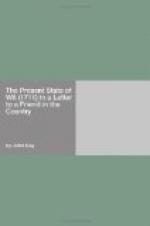Nothing Surprizes me more, than to see Men Laugh so freely at a Comedy, and yet account it a silly weakness to Weep at a Tragedy. For is it less natural for a Man’s Heart to relent upon a Scene of Pity, than to be transported with Joy upon one of Mirth and Humour? Or is it only the alteration of the Features of one’s Face that makes us forbear Crying? But this alteration is undoubtedly as great in an immoderate Laughter, as in a most desperate Grief; and good Breeding teaches us to avoid the one as well as the other, before those for whom we have a Respect. Or is it painful to us to appear tender-hearted and express grief upon a Fiction? But without quoting great Wits who account it an equal Weakness, either to weep or laugh out of Measure, can we expect to be tickled by a Tragical Adventure? And besides, is not Truth as naturally represented in that as in a Comical one? Therefore as we do not think it ridiculous to see a whole Audience laugh at a merry jest or humour acted to the life, but on the contrary we commend the skill both of the Poet and the Actor; so the great Violence we use upon our selves to contain our tears, together with the forc’d a-wry smiles with which we strive to conceal our Concern, do forcibly evince that the natural effect of a good Tragedy is to make us all weep by consent, without any more ado than to pull out our Handkerchiefs to wipe off our Tears. And if it were once agreed amongst us not to resist those tender impressions of Pity, I dare engage that we would soon be convinc’d that by frequenting the Play-house we run less danger of being put to the expence of Tears, than of being almost frozen to death by many a cold, dull insipid jest.
We must make it our main Business and Study to think and write well, and not labour to submit other People’s Palates and Opinions to our own; which is the greater difficulty of the two.
One should serve his time to learn how to make a Book, just as some men do to learn how to make a watch, for there goes something more than either Wit or Learning to the setting up for an Author. A Lawyer of this Town was an able, subtle and experienc’d Man in the way of his Business, and might for ought I know, have come to be Lord Chief Justice, but he has lately miscarried in the Good Opinion of the World, only by Printing some Essays which are a Master-piece—in Nonsense.
It is a more difficult matter to get a Name by a Perfect Composure, than to make an indifferent one valued by that Reputation a Man has already got in the World.
There are some things which admit of no mediocrity; such as Poetry, Painting, Musick and Oratory—What Torture can be greater than to hear Doctor F—— declaim a flat Oration with formality and Pomp, or D—— read his Pyndaricks with all the Emphasis of a Dull Poet.
We have not as yet seen any excellent Piece, but what is owing to the Labour of one single Man: Homer, for the purpose, has writ the Iliad; Virgil, the AEneid; Livy his Decads; and the Roman Orator his Orations; but our modern several Hands present us often with nothing but a Variety of Errors.




